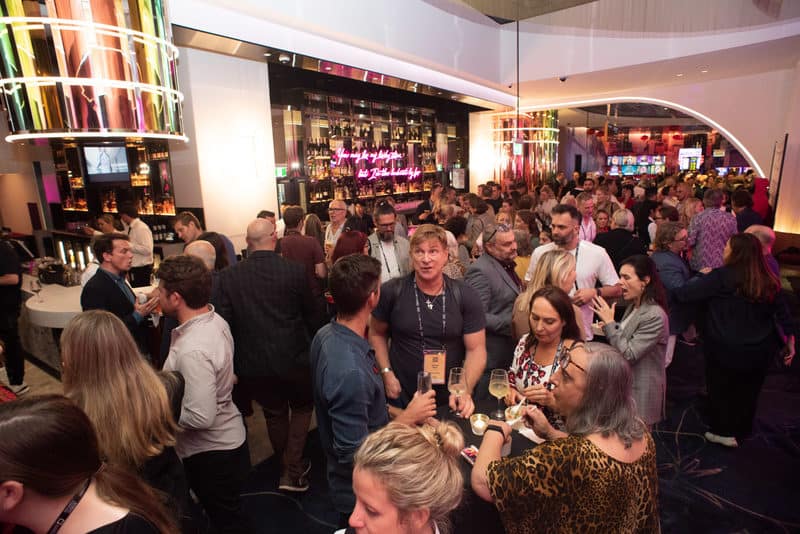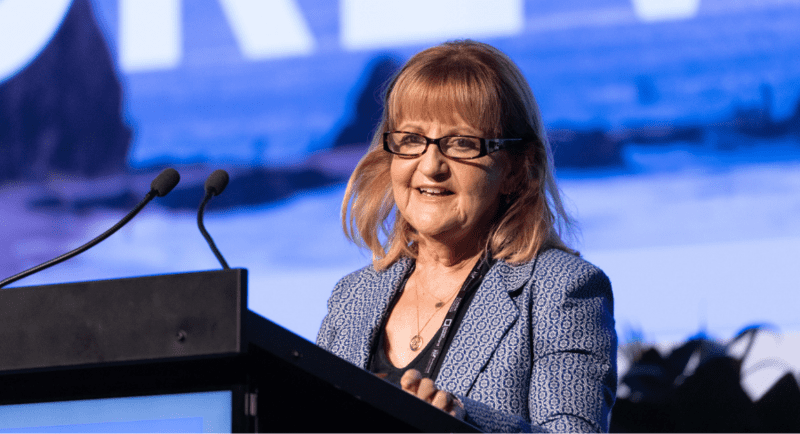The Hector Crawford Memorial Lecture at the annual Screen Forever conference is always a highlight. This year delegates got to hear from Australia’s Cathy Payne, the CEO of Banijay Rights. Everybody loves a list, and even more so if it is delivered by the leader of the world’s biggest distributor of TV content.
Payne started off her Screen Forever presentation with memories of how she started in the industry:
“Totally by misfortune or luck (my interpretation depends on the day), I found myself employed as the assistant to the chief executive of Hanna-Barbera Australia Distribution, part of the Taft Hardie Group. Following the relocation of Hanna-Barbera animation studios to Australia (then the cost-effective market in Asia Pacific), distribution rights to the Hanna-Barbera catalogue across Australia, New Zealand, South Africa and then what was called the Far East (Asia) sat with the Taft Hardie Group. At the same time, the group was making its first moves into its own original productions which included first works such as coproduction Deadline and the global sensation Return to Eden from McElroy and McElroy.
“Hanna-Barbera Distribution – at that time – had two permanent team members: the chief executive and myself. What a better training ground than to learn everything from deal making, contracting, content delivery and finance. Being a mad Scooby Doo and Wacky Races fan also helped.
“The Taft Hardie Group then became Southern Star, with its original production growing including the fabulous ground-breaking series from John Edwards/Sandra Levy in Police Rescue, (my first Cannes market featured Gary Sweet dangling from a helicopter) followed by long Australian stalwarts in Blue Heelers and Water Rats (both from McElroy Productions) to name just a few. Distribution of third-party titles started to grow along with a push into theatrical (Broken Highway, Country Life, Metal Skin, The Well, The Sum of Us to name just a few).
Cathy Payne at Screen Forever: Taking Australian TV to the world
“Then came international expansion with the acquisition of the Circle Group in London, which included Carnival Films, and soon followed by Primetime which resulted in distribution of Seven Networks’ Home and Away returning to Australian hands.
“Local Australian production continued to grow and a joint venture with Endemol saw the Group broaden into entertainment and reality led by Big Brother and Deal or No Deal. Third party representation also continued to expand, including distribution deals with the Australian Networks – Nine with McLeod’s Daughters in association with Millennium Television and The Block – and the Seven Network with My Restaurant Rules/My Kitchen Rules and later A Place to Call Home.”
Payne then mentioned Southern Star then became part of Southern Cross Broadcasting and then Fairfax.
“Each owned the company for a period followed by a sale to the Endemol Group, whom had been our joint venture partners. Across these years I had moved from being the second in a team of two, to handling sales in Asia (squeezing in a crazy two-year mad adventure gap), followed by Latin America, North America, Africa, MENA and Europe /UK, rising up the ranks and managing to survive each acquisition and merger.
“At the time of the Endemol acquisition, we knew in our hearts (and may I name my two fabulous colleagues Rory Callaghan and Hugh Marks), that the right move for the company was to join with Endemol. Needless to say, after coming out of a surprising change in my life circumstances, they convinced me to move to London to integrate the Southern Star and Endemol businesses. I agreed to do it for one year. In the interim, Endemol had recruited who was to be my new boss. ‘Polar opposites’ is probably the best description and as I said to one such male colleague on arrival: ‘you only have to put up with me for a year, so let us make the best of it and get on’.
“That is now 11-plus years ago. Endemol then merged with Shine Group which then was sold in late 2019 to the Banijay Group. Somehow, through all of that, I kept taking a deep breath and rising to the opportunity (and challenge). Covid then hit and the acquisition was completed in July 2020, a few months into the pandemic. The full integration of the business happened largely via video conference and was built on the goodwill of the teams on both sides.”

Delegates networking at Screen Forever
As chief executive of Banijay Rights, the international distribution arm of Banijay group, Payne oversees a catalogue of over 120,000 hours and an “insatiable wish to grow”.
“We are the largest production and distribution group outside of the Hollywood Studios with over 120 production companies located in 22 territories. We distribute by every which way or another you can imagine – whether it be free or pa, premium pay linear, SVOD, AVOD, FVOD (self-published) or licensed, local adaptation, monetised social media, brand licensing, and or in-between.
“Included within that mammoth library are over 16,000 hours of cherished Australian content which includes titles ranging from Banana’s in Pyjamas, Blue Murder, City Homicide, The Secret Life of Us, Love My Way, Offspring, Blue Water High, Always Greener, Murder Call, A Beautiful Lie, Tangle, Party Tricks, Gallipoli, Howzat!, Young Lions, Fireflies, Puberty Blues, Rescue Special Operations, Wolf Creek All Saints … and so the list goes on. We know a thing or two when it comes to selling Australian scripted.”
Payne also recalled her time working with the recently passed group executive Neil Balnaves. “Southern Star was Neil’s vision and he achieved so much in the launch of the company and its expansion internationally. Neil was a person who pushed you to the limits, but he also had a knack of identifying strong talent. He gave back and his philanthropy into the arts with a focus on supporting indigenous craft is to be applauded. I still remember Neil wanting butter served with the bread for lunch on our Cannes market stands – and as I always said to him: ‘it is in the champagne bucket as the waiter is worried it will melt. Dare me to argue Neil but I have a few other priorities to hand other than your butter’. Neil would laugh and give me one of his huge bear hugs. Vale Neil.”
Payne also shared her list of eight rules to help navigate the industry successfully:
No.1 A good story can truly come from anywhere, whether that be original IP or adapted. Your competition is truly global.
No.2 ‘Prepare’ – just as important as your passion for the story you wish to tell, is your ability to sell it in.
No.3 Understand the finance.
No.4 Don’t pitch your entire slate – it’s exhausting for you and your audience and if they say they are not seeking any YA programming for example, don’t pitch them a YA show.
No.5 Pick your partners well – your finance and distributor partnership is crucial.
No.6 Know those you are pitching to and why/where your project would sit in their world.
No.7 Work for long term success – choose where you feel your series can build and grow – that is not always where the biggest money lies.
No.8 Be a voice in local lobbying initiatives.
Fixing Australia’s finance model
“The Australian television financing model is very challenged when you compare that to internationally and this needs to be addressed if we are to truly compete. Licence fees – as a percentage of budget – are challenging for scripted and the concept of not offering a global platform a window in the Australian domestic territory, when you are seeking a significant budget contribution from them is simply a non-starter. To not stimulate the industry will see a continued talent drain. I love Australian scripted, but my balance sheet doesn’t lie in that out of my 20 most unsuccessful program global investments over my career, over 60% were Australian scripted. The key reason: most of them were good ideas but need further development.”
See also: Screen Forever Day 1: Suspended content quotas damage, Regulation for streamers
